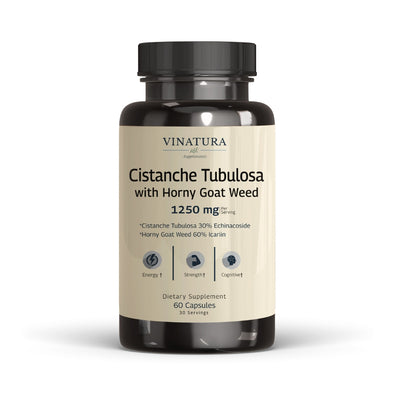
Is Tongkat Ali A Good Aromatase Inhibitor?
Tongkat Ali is renowned for its natural testosterone-boosting benefits, with numerous mechanisms studied and debated. One of the mechanisms mentioned involves acting as an aromatase inhibitor.
So, is Tongkat Ali a good aromatase inhibitor? What does science say about it? This blog post will explore the answer and introduce other functional foods with aromatase inhibitor properties.
Before exploring further, please read the disclaimer located at the end of this webpage.
Key Takeaways
- There aren't many reputable studies acknowledging Tongkat Ali as a good aromatase inhibitor.
- One laboratory study observed an increase in testosterone and a decrease in estrogen when combined with formestane - an aromatase inhibitor.
- Tongkat Ali doesn't directly reduce estrogen, but it has been shown to inhibit the conversion of testosterone to estrogen in some studies.
What is Aromatase?
Aromatase, also known as estrogen synthetase or estrogen synthase, is an enzyme that plays a crucial role in the biosynthesis of estrogens.
These hormones are primarily responsible for the growth and upkeep of female reproductive tissues.
The enzyme aromatase is present in multiple tissues throughout the body, such as the ovaries, testes, adrenal glands, placenta, and adipose (fat) tissues [1].
Aromatase plays a vital role in many physiological processes:
- In women, it plays a vital role in the development of secondary sexual characteristics, regulation of the menstrual cycle, and preservation of bone health.
- In men, aromatase is crucial in converting testosterone to estrogen, ensuring a delicate equilibrium between androgens and estrogens within the body [2].

Is Tongkat Ali a Good Aromatase Inhibitor?
Many studies have confirmed Tongkat Ali's testosterone-boosting effects, but few delve into its aromatase inhibitor mechanism.
One study directly addressing this mechanism observed increased testosterone and reduced estrogen when combining eurycomanone (a key component in Tongkat Ali) with formestane (an aromatase inhibitor) [4].
Eurycomanone promotes testosterone synthesis in Leydig cells by inhibiting the aromatase enzyme that converts testosterone into estrogen [4].
However, this study was conducted in vitro, and the distinct efficacy in reducing estrogen for Tongkat Ali and formestane needed to be clearly distinguished.
Therefore, the basis for confirming Tongkat Ali as a potent aromatase inhibitor is insufficient.
Nevertheless, this study acknowledges Tongkat Ali's potential for testosterone enhancement, suggesting further in vivo research for Tongkat Ali in addressing male infertility issues.
Also read: Will Tongkat Ali Fail A Drug Test? Benefits For Athletes
Scientific Studies Proof
According to a scientific study published in Molecules, a peer-reviewed open-access scientific journal, it was found that Eurycomanone, the main quassinoid in Tongkat Ali root extract, enhances testosterone synthesis in Leydig cells of mouse testes by inhibiting the aromatase conversion of testosterone to estrogen [7].
Additionally, the standardized extract of Tongkat, which contains high concentrations of quassinoids (20% eurycomanone and 4% 13α,21-dihydroeurycomanone), may have potential anti-estrogenic effects [7].
In a more recent study, Tongkat Ali root extract induced testosterone synthesis along with an increase in luteinizing hormone and follicle-stimulating hormone but reduced estrogen levels [8].
Potential Side Effects of Tongkat Ali Related to Estrogen
While Tongkat Ali is widely known for its ability to boost testosterone, there’s a lesser-known aspect that involves potential side effects related to estrogen.
When testosterone levels rise, the body tends to convert some of the excess testosterone into estrogen through a process known as aromatase. This can lead to a range of unwanted symptoms for certain users.
Increased Estrogen Levels and Symptoms
One of the most common side effects associated with rising estrogen levels is chronic fatigue. According to James Halton - a user of Tongkat Ali: "Although I experience positive effects from increased testosterone, such as improved libido and better workout performance, I also begin to feel unusually fatigued when not engaged in physical activity. This fatigue could be the result of the body converting too much testosterone into estrogen, leading to a hormonal imbalance."
Additionally, a condition called gynecomastia, or the enlargement of male breast tissue, is another potential side effect that James and some individuals experience. Elevated estrogen levels can cause "puffiness" or increased breast tissue, especially in those who have had a history of gynecomastia. This has been observed in people using other testosterone-boosting supplements, and it could also occur with Tongkat Ali.
A Potential Solution to Control Aromatase
If you notice side effects related to elevated estrogen while using Tongkat Ali, it doesn’t necessarily mean you need to stop using the supplement altogether. An alternative approach is to incorporate natural aromatase inhibitors, such as grape seed extract, to prevent the conversion of testosterone into estrogen.
This way, you can continue to benefit from Tongkat Ali’s testosterone-boosting properties without experiencing the estrogen-related side effects.
5+ Aromatase Inhibitor Supplements
Here are some examples of supplements that are sometimes mentioned for their potential aromatase-inhibitory effects:
- DIM (Diindolylmethane)
- Grape Seed Extract
- White Button Mushroom Extract
- Chrysin
- Resveratrol
- Saw palmetto
- Maca
- Wild nettle root
- Calcium D glucarate
- Diindolylmethane
- Cyperus
You may also like: Tongkat Ali Vs Tribulus - Comparison And Combination
Frequently Asked Questions
Does Tongkat Ali Lower Estrogen In Men?
Although Tongkat Ali has been extensively studied for its potential impact on testosterone levels, there currently needs to be more research demonstrating its ability to reduce estrogen levels in men. However, a study has shown that Tongkat Ali reduces the inhibition of estrogen on spermatocytes in men. It can correct excess estrogen or testosterone deficiency - the cause of infertility [5].
Is Tongkat Ali Good for Reducing Estrogen?
Studies on Tongkat Ali reducing estrogen levels are still vague, unclear, and uncertain. However, studies suggest that Tongkat Ali may exhibit anti-estrogenic effects by inhibiting the aromatase enzyme responsible for converting testosterone into estrogen.
Conclusion
In conclusion, the answer to the question "Is Tongkat Ali A Good Aromatase Inhibitor?" is unclear. There is some promising evidence that Tongkat Ali may have aromatase inhibitory effects.
However, more research is needed to fully understand its potential and determine the optimal dosage for this purpose.
Nonetheless, Tongkat Ali remains an important traditional medicine with multiple health benefits, including improving fertility and sexual health in men.
Try out Tongkat Ali and see the results yourself! Keep checking our blog for more informative content on health and wellness.
References
- [1] Bulun, S. E., Zeitoun, K., Sasano, H., & Simpson, E. R. (1999). Aromatase in Aging Women. Seminars in Reproductive Medicine, 17(04), 349–358. https://doi.org/10.1055/s-2007-1016244
- [2] Haverfield, J., Ham, S., Brown, K. A., Simpson, E. R., & Meachem, S. J. (2011). Teasing out the role of aromatase in the healthy and diseased testis. Spermatogenesis, 1(3), 240–249. https://doi.org/10.4161/spmg.1.3.18037
- [3] A Multifaceted Review of Eurycoma longifolia Nutraceutical Bioactives: Production, Extraction, and Analysis in Drugs and Biofluids. (2023). ACS Omega. https://pubs.acs.org/doi/full/10.1021/acsomega.2c06340
- [4] Low, B.-S., Sy Bing Choi, Wahab, H. A., Das, P. K., & Chan, K. (2013). Eurycomanone, the major quassinoid in Eurycoma longifolia root extract increases spermatogenesis by inhibiting the activity of phosphodiesterase and aromatase in steroidogenesis. Journal of Ethnopharmacology, 149(1), 201–207. https://doi.org/10.1016/j.jep.2013.06.023
- [5] George, A., & Henkel, R. (2014). Phytoandrogenic properties ofEurycoma longifoliaas natural alternative to testosterone replacement therapy. Andrologia, 46(7), 708–721. https://doi.org/10.1111/and.12214
- [6] Talbott, S., Talbott, J. A., George, A., & Pugh, M. (2013). Effect of Tongkat Ali on stress hormones and psychological mood state in moderately stressed subjects. Journal of the International Society of Sports Nutrition, 10(1). https://doi.org/10.1186/1550-2783-10-28
- [7] Shaheed Ur Rehman, Kevin Kyungsik Choe, & Hye Hyun Yoo. (2016). Review on a Traditional Herbal Medicine, Eurycoma longifolia Jack (Tongkat Ali): Its Traditional Uses, Chemistry, Evidence-Based Pharmacology and Toxicology. Molecules, 21(3), 331–331. https://doi.org/10.3390/molecules21030331
- [8] Sasikala Chinnappan, George, A., Pandey, P., Govinda Narke, & Yogendra Kumar Choudhary. (2021). Effect of Eurycoma longifolia standardised aqueous root extract–Physta® on testosterone levels and quality of life in ageing male subjects: a randomised, double-blind, placebo-controlled multicentre study. Food & Nutrition Research, 65. https://doi.org/10.29219/fnr.v65.5647
Author

Product Disclaimer
The dietary supplement products mentioned on this website are formulated based on scientific research and adhere to FDA guidelines for dietary supplements. However, the content of the articles has not been evaluated by the Food and Drug Administration (FDA) and is not intended to promote or endorse any specific product. Any products sold on this website are not intended to diagnose, treat, cure, or prevent any disease.
Opinions and Endorsements
Any claims, statements, or opinions expressed in the articles are those of the author(s) and do not necessarily reflect the views or opinions of the manufacturers of the dietary supplement products. The products sold on this website are separate from the content of the articles and are not directly endorsed or associated with the information presented here.
Liability Disclaimer
The author(s) of the articles, website, and manufacturers of the dietary supplement products do not assume any liability for any potential consequences arising from the use of the information provided in the articles. It is recommended that individuals consult with a qualified healthcare professional before making any dietary or lifestyle changes, including the use of dietary supplements.
Product Usage
Please refer to the product labels and packaging for specific usage instructions and guidelines for the dietary supplement products sold on this website.
Customer Support
For any concerns or questions regarding the dietary supplement products, please contact our customer support team, who will be more than happy to assist you.








Leave a Comment
Be the first to comment.
What do you think?